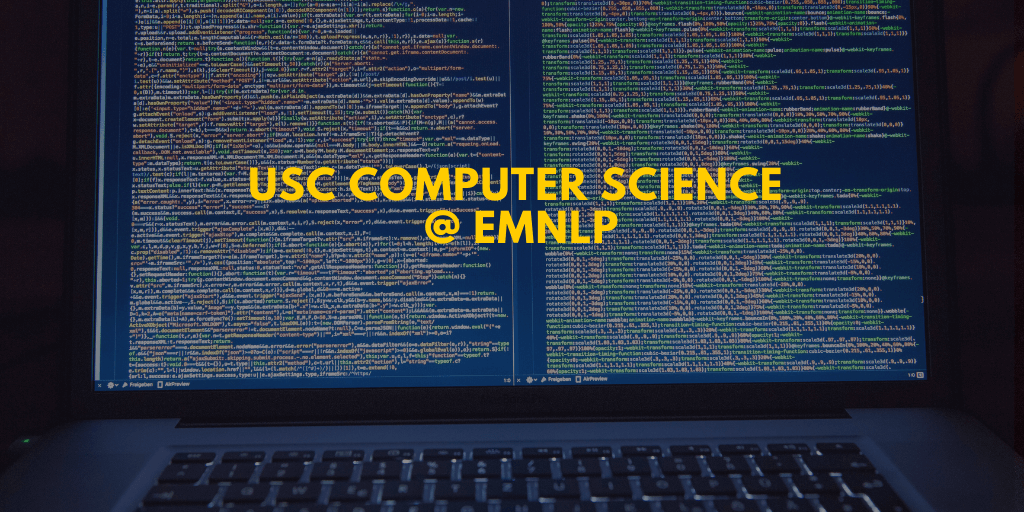
From commonsense reasoning and decision making to dialogue navigation and reinforcement learning, 22 papers authored by USC computer science researchers papers have been accepted to this year’s Conference on Empirical Methods in Natural Language Processing (EMNLP), with 13 papers in the main conference and 9 papers at a new sister publication called Findings of EMNLP. Overall, EMNLP accepted 602 long papers and 151 short papers, with a 22.4 percent and 15.5 percent acceptance rate respectively.
Xiang Ren, an assistant professor of computer science, leads the Intelligence and Knowledge Discovery Research Lab (INK) at USC, with 11 accepted papers.
“This is a very competitive conference, and USC’s strong presence demonstrates that we have a large group of people working on top-notch research in the area of natural language processing,” said Ren. “This will only continue to strengthen when incoming faculty members Robin Jia, current at Stanford, and Jesse Thomason, currently at the University of Washington, joining in the coming fall.”

Assistant Professor Xiang Ren.
Ren also notes that many papers accepted from his lab, and across the department, are authored or co-authored by students during the pandemic.
“I’m thrilled to have several papers accepted in EMNLP this year, especially with most the work completed amid the COVID situation. This is a very hard time for students and for collaboration in general, due to the limited in-person meeting opportunities. I’m glad that our lab maintains a strong culture and good motivation in the past year to make this happen. I am very proud of all of my students.”
The conference took place online Nov. 16 – 20
Analogous Process Structure Induction for Sub-event Sequence Prediction.
Hongming Zhang, Muhao Chen, Haoyu Wang, Yangqiu Song, Dan Roth. EMNLP 2020.
Birds have four legs?! NumerSense: Probing Numerical Commonsense Knowledge of Pre-trained Language Models
Bill Yuchen Lin, Seyeon Lee, Rahul Khanna, Xiang Ren. EMNLP 2020.
Connecting the Dots: Event Graph Schema Induction with Path Language Modeling
Manling Li, Qi Zeng, Ying Lin, Kyunghyun Cho, Heng Ji, Jonathan May, Nathanael Chambers, Clare Voss. EMNLP 2020.
Experience Grounds Language
Yonatan Bisk*, Ari Holtzman*, Jesse Thomason*, Jacob Andreas, Yoshua Bengio, Joyce Chai, Mirella Lapata, Angeliki Lazaridou, Jonathan May, Aleksandr Nisnevich, Nicolas Pinto, Joseph Turian. EMNLP 2020.
Joint Constrained Learning for Event-event Relation Extraction.
Haoyu Wang, Muhao Chen, Hongming Zhang, Dan Roth. EMNLP 2020.
Knowledge Association with Hyperbolic Representation Learning of Knowledge Graphs.
Zequn Sun, Muhao Chen, Wei Hu, Chengming Wang. EMNLP 2020.
Learning Collaborative Agents with Rule Guidance for Knowledge Graph Reasoning
Deren Lei*, Gangrong Jiang*, Xiaotao Gu, Kexuan Sun, Yuning Mao, Xiang Ren. EMNLP 2020.
Multi-document Summarization with Maximal Marginal Relevance-guided Reinforcement Learning
Yuning Mao, Yanru Qu, Yiqing Xie, Xiang Ren, Jiawei Han. EMNLP 2020.
Recurrent Event Network: Autoregressive Structure Inference over Temporal Knowledge Graphs
Woojeong Jin, Meng Qu, Xisen Jin, Xiang Ren. EMNLP 2020.
Scalable Multi-Hop Relational Reasoning for Knowledge-Aware Question Answering
Yanlin Feng*, Xinyue Chen*, Bill Yuchen Lin, Peifeng Wang, Jun Yan, Xiang Ren. EMNLP 2020.
SynSetExpan: An Iterative Framework for Joint Entity Set Expansion and Synonym Discovery
Jiaming Shen, Wenda Qiu, Jingbo Shang, Michelle Vanni, Xiang Ren, Jiawei Han. EMNLP 2020.
Visually Grounded Continual Learning of Compositional Phrases
Xisen Jin, Junyi Du, Arka Sadhu, Ram Nevatia, Xiang Ren. EMNLP 2020.
With Little Power Comes Great Responsibility
Dallas Card, Peter Henderson, Urvashi Khandelwal, Robin Jia, Kyle Mahowald, Dan Jurafsky. EMNLP 2020
CommonGen: A Constrained Text Generation Challenge for Generative Commonsense Reasoning
Bill Yuchen Lin, Ming Shen, Pei Zhou, Chandra Bhagavatula, Yejin Choi, Xiang Ren. EMNLP 2020 (Findings).
Connecting the Dots: A Knowledgeable Path Generator for Commonsense Question Answering
Peifeng Wang, Nanyun Peng, Pedro Szekely, Xiang Ren. EMNLP 2020 (Findings).
Finding the Optimal Vocabulary Size for Neural Machine Translation
Thamme Gowda, Jonathan May. EMNLP 2020 (Findings).
Learning to Generalize for Sequential Decision Making
Xusen Yin, Ralph Weischedel, Jonathan May. EMNLP 2020 (Findings).
Multilingual Knowledge Graph Completion via Ensemble Knowledge Transfer
Xuelu Chen, Muhao Chen, Changjun Fan, Ankith Uppunda, Yizhou Sun, Carlo Zaniolo. EMNLP 2020 (Findings).
On the Importance of Adaptive Data Collection for Extremely Imbalanced Pairwise Tasks
Stephen Mussmann, Robin Jia, Percy Liang. EMNLP 2020 (Findings).
RICA: Evaluating Robust Inference Capabilities Based on Commonsense Axioms
Pei Zhou, Rahul Khanna, Bill Yuchen Lin, Daniel Ho, Jay Pujara, Xiang Ren. EMNLP 2020 (Findings).
RMM: A Recursive Mental Model for Dialog Navigation
Homero Roman Roman, Yonatan Bisk, Jesse Thomason, Asli Celikyilmaz, Jianfeng Gao. EMNLP 2020 (Findings).
Teaching Machine Comprehension with Compositional Explanations
Qinyuan Ye, Xiao Huang, Elizabeth Boschee, Xiang Ren. EMNLP 2020 (Findings).
Published on November 20th, 2020
Last updated on May 16th, 2024













